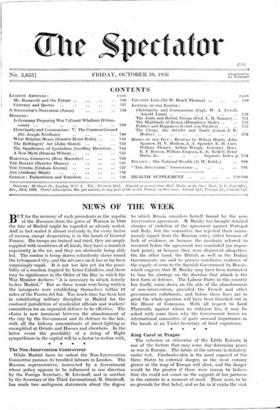The Non-Intervention Controversy While Madrid' faces its ordeal the Non-Intervention
Committee pursues its troubled labours in London. The Russian representative, instructed by a Government whose policy appears to be influenced in one direction by. the Foreign Secretary, M. Litvinoff, and in another by the Secretary of the Third International, M. Dimitroff, has made two ambiguous statements about the degree to which Russia considers herself bound by the non- intervention agreement. M. Maisky has brought detailed charges of violation of the agreement against Portugal and Italy, but the committee has rejected them unani- mously (apart from the Russian vote), either because of lack of evidence, or because the incidents referred to occurred before the agreement was concluded (an impor- tant point), or because they were disproved altogether. On the other hand, the British as well as the Italian Governments are said to possess conclusive evidence of the supply of arms to the Spanish Government by Russia, which suggests that M. Maisky may have been instructed to base his strategy on the doctrine that attack is the best form of defence. The Labour Party in this country has finally come down on the side of the abandonment of non-intervention, provided the French and other governments collaborate, and before these lines are in print the whole question will have been thrashed out in the House of Commons. With all respect to Lord Plymouth, against whom no criticism lies, it may be asked with some force why the Government leaves an international committee of quite unusual importance in the hands of an Under-Secretary of brief experience.
* * * *




















































